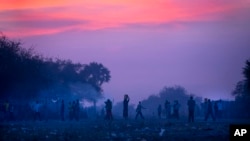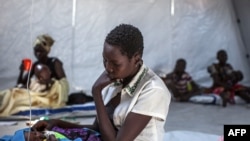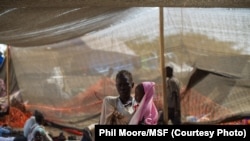BOR —
When Mary Yar was shot in the chest last month by anti-government forces who overran the town of Bor for the second time in as many weeks, she walked two kilometers to the nearest hospital for care.
That's where anti-government troops threatened to rape and rob the grandmother in her sixties.
“'Let us have sex with you. Bring your phone and money.' This is all that they want," Yar told VOA.
"I told them that my dead husband would not ask me for sex at this age. I told them, 'You are my sons' and they never raped me. But other, younger women were raped," she said.
"They don’t behave like human beings. How can my sons ask for sex from me?”
Ayor Garang, who was at the same hospital as Yar for treatment of a back problem, said two other patients -- one a former soldier who lost his leg during the long war with Sudan and the other a man he called Hussein -- were shot and their bodies dumped outside.
Weeks later, the corpses of the two men were still outside the hospital, Garang said.
Deng Dau Deng, chair of the Greater Bor Caucus in the National Assembly, said local officials in the town have estimated that at least 2,000 people were killed in fighting in Bor.
Near the hospital, the bodies of 14 women lay on the grounds of the Anglican church compound.
"Maybe when the fighting occurred, they ran here thinking it is a safe place," June Malet, a lawmaker for Bor at the National Assembly, told VOA..
"They think the fighting is between the soldiers. They think they are ordinary people, the soldiers don’t need them,” Malet said.
Later the same day, Malet found her mother’s body in the family home. She had been shot and killed.
People in Bor and representatives of President Salva Kiir's government accuse opposition forces of leveling the town and killing civilians, but opposition spokesman Yohanis Musa rejected the accusation.
"Bor is our town. We cannot destroy it," Musa told VOA from Addis Ababa, where the two sides in the conflict are holding slow-moving peace talks.
He blamed the death and destruction in Bor on the government and Ugandan troops who are fighting on the side of Kiir and "bombing the town every day."
"The South Sudan government are the ones who brought in Ugandan troops, so they are the ones who can hold responsibility as well," Musa said.
No official death toll has been given for any of the fighting in South Sudan, but a U.N. official who visited the country this week, including towns like Bor, Bentiu and Malakal that have seen heavy fighting, said he believed "many thousands" have perished in the country since it plunged into violence on Dec. 15.
The UN Office for the Coordination of Humanitarian Affairs (OCHA) said in its latest report on South Sudan that more than half a million people have been forced from their homes by the fighting, including 114,500 in Jonglei state.
Many of those who fled Bor headed to Ethiopia or across the White Nile River into Lakes state, while around 10,000 are sheltering in U.N. bases in and around the town.
OCHA described Bor as being "virtually empty of civilians" last week as the security situation grew more tense. Aid flights were put on hold, and officials warned that the displaced in Bor "urgently require healthcare," in particular vaccinations against measles, which has already claimed the lives of an unspecified number of children in camps for the displaced.
OCHA also said that people wounded in the fighting in Bor and Bentiu, the capital of Unity state, are in desperate need of emergency surgery. More than 3,100 people have been treated for gunshot wounds around South Sudan, the U.N. agency said.
Amid the desolation and destruction, some residents of Bor, like 19-year-old Andrew Akuok, who fled across the White Nile to Lakes state before the most recent bout of fighting in the capital of Jonglei state, are beginning to make their way back home.
“We are not people of Lakes state. We are people of Jonglei state," Akuok told VOA.
"Even though we lost many people, we will come back. We will come back, all,” he said.
That's where anti-government troops threatened to rape and rob the grandmother in her sixties.
I told them, 'You are my sons' and they never raped me. But other, younger women were raped.Mary Yar, resident of Bor, South Sudan
“'Let us have sex with you. Bring your phone and money.' This is all that they want," Yar told VOA.
"I told them that my dead husband would not ask me for sex at this age. I told them, 'You are my sons' and they never raped me. But other, younger women were raped," she said.
"They don’t behave like human beings. How can my sons ask for sex from me?”
Ayor Garang, who was at the same hospital as Yar for treatment of a back problem, said two other patients -- one a former soldier who lost his leg during the long war with Sudan and the other a man he called Hussein -- were shot and their bodies dumped outside.
Weeks later, the corpses of the two men were still outside the hospital, Garang said.
Deng Dau Deng, chair of the Greater Bor Caucus in the National Assembly, said local officials in the town have estimated that at least 2,000 people were killed in fighting in Bor.
Near the hospital, the bodies of 14 women lay on the grounds of the Anglican church compound.
"Maybe when the fighting occurred, they ran here thinking it is a safe place," June Malet, a lawmaker for Bor at the National Assembly, told VOA..
"They think the fighting is between the soldiers. They think they are ordinary people, the soldiers don’t need them,” Malet said.
Later the same day, Malet found her mother’s body in the family home. She had been shot and killed.
Government, Opposition Swap Blame for Bor Destruction
People in Bor and representatives of President Salva Kiir's government accuse opposition forces of leveling the town and killing civilians, but opposition spokesman Yohanis Musa rejected the accusation.
"Bor is our town. We cannot destroy it," Musa told VOA from Addis Ababa, where the two sides in the conflict are holding slow-moving peace talks.
He blamed the death and destruction in Bor on the government and Ugandan troops who are fighting on the side of Kiir and "bombing the town every day."
"The South Sudan government are the ones who brought in Ugandan troops, so they are the ones who can hold responsibility as well," Musa said.
No official death toll has been given for any of the fighting in South Sudan, but a U.N. official who visited the country this week, including towns like Bor, Bentiu and Malakal that have seen heavy fighting, said he believed "many thousands" have perished in the country since it plunged into violence on Dec. 15.
The UN Office for the Coordination of Humanitarian Affairs (OCHA) said in its latest report on South Sudan that more than half a million people have been forced from their homes by the fighting, including 114,500 in Jonglei state.
Many of those who fled Bor headed to Ethiopia or across the White Nile River into Lakes state, while around 10,000 are sheltering in U.N. bases in and around the town.
OCHA described Bor as being "virtually empty of civilians" last week as the security situation grew more tense. Aid flights were put on hold, and officials warned that the displaced in Bor "urgently require healthcare," in particular vaccinations against measles, which has already claimed the lives of an unspecified number of children in camps for the displaced.
OCHA also said that people wounded in the fighting in Bor and Bentiu, the capital of Unity state, are in desperate need of emergency surgery. More than 3,100 people have been treated for gunshot wounds around South Sudan, the U.N. agency said.
Amid destruction, Bor residents start coming home
Amid the desolation and destruction, some residents of Bor, like 19-year-old Andrew Akuok, who fled across the White Nile to Lakes state before the most recent bout of fighting in the capital of Jonglei state, are beginning to make their way back home.
“We are not people of Lakes state. We are people of Jonglei state," Akuok told VOA.
"Even though we lost many people, we will come back. We will come back, all,” he said.











